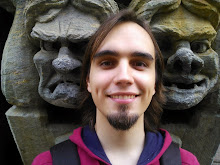Sepulchral Frost
The gravestone’s coldness dissects streams of wind.
In solitude’s transparency a sepulchral rainfall bursts.
And on the headstone of my last resort
An inscription shines, hidden by withered leafs.
Six feet under the ground: it lies, consumed by worms,
Covered with loose, airy earth, with eyelids eaten away:
My corpse, forsaken organic matter,
That ceased to act as a living embodiment of mind-body unity;
That is simply a rotten mass feasted by Nature,
Out of which my corpse emerged some years ago,
While still being alive, hurrying to live, spurting towards joys
And sorrows of yet another illusion called the life path
Of an isolated personality that grows and develops under the blue sky,
The moon and the stars that shine with an elusive mystery,
The mystery which is so easy to miss in the face of the enchanted
Vibrating web of meanings that we weave as we dwell in our collective dreaming.
In my heart, ever since the moment of my birth, there was this sepulchral frost,
And behind the left shoulder, near my ear, I felt someone’s breathing,
And someone’s whisper pontificated to me that, while being alive,
Somewhere there, very near, right in my Heart
I’ve never been born. And my hour has struck but nothing changed:
All these years were dreamt by me when my body was already enthralled
By this cadaveric freeze. Another day on the planet Earth,
In the Milky Way galaxy, on the outskirts of this universe
Was lived by me. In vain or not in vain, that is the question of no significance
On the back of the monumental triumph of kosmic void
And her unstoppable life, in contrast to which I am only
A weak shimmering of a body shell swept away by a blink of Eternity.
Let the memory of me as of an unnoted sparkle remain
In the great sentient archives of the undying Kosmos.
And one day when the right time comes the good I’ve done here and now
Will grow into a gigantic wave, humongous sea of Goodness
Which will destroy all ignorance and bring eternal peace and joy—
At least for a moment. And I will cry for all the cursed and all the blessed.
April 27, 2010
(translated from Russian)



